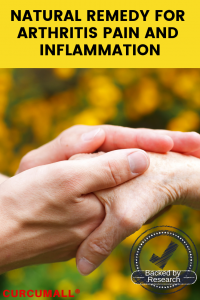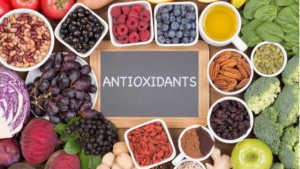There is scientific evidence that supports the efficacy of turmeric extract as well as a ginger extract to support joint health.
What is Arthritis?
The term arthritis is derived from the Greek words “artho” meaning joint and “itis” meaning inflammation.
According to the Arthritis Foundation, Arthritis is not a single disease; it is an informal way of referring to joint pain or joint disease, with over 100 different forms of it.
More than 50 million adults have some type of arthritis. It is most common among women and occurs more frequently as people get older.
The most common form of Arthritis is osteoarthritis, but other include rheumatoid arthritis, psoriatic arthritis, and related autoimmune diseases.
Osteoarthritis is a type of degenerative Arthritis. It happens when the cartilage – the slick, cushioning surface on the ends of bones – wears away causing the bones to rub against each other, causing pain, swelling and stiffness. Over time, joints can lose strength and pain may become chronic.
Rheumatoid arthritis and psoriatic arthritis are examples of inflammatory arthritis. It happens when there is chronic inflammation in the body and it mistakenly attacks the joints, potentially causing joint erosion (read more about chronic inflammation here).
Common arthritis symptoms include swelling, pain, stiffness and decreased range of motion in the affected joints. Symptoms may come and go. They can be mild, moderate or severe. They may stay about the same for years but may progress or get worse over time.
Current Treatment
The exact cause of arthritis is still uncertain, and there is no treatment for its fundamental causes. The major goal of current arthritis treatment is to reduce joint pain induced by inflammation in the joints, daily wear and tear of joints, and muscle strains.
The existing pharmaceuticals for treating arthritis are analgesics, steroids, and nonsteroidal anti-inflammatory drugs (NSAIDs), which reduce the symptoms such as severe pain and inflammation.
However, the drugs have some adverse effects in the gastrointestinal tract and cardiovascular system.
Turmeric for Joint Health
Many studies show that turmeric and its active ingredient curcumin have strong anti-oxidation properties, abilities to support natural healthy inflammatory processes, and modifies immune system responses.
Curcumin is believed to exert its effects through regulation of enzymatic activities. It has been found to regulate numerous molecular targets and pathways that are linked to inflammation.
A 2016 systematic review and meta-analysis provided scientific evidence that turmeric extracts (typically 1000 mg/day of curcumin) can assist in maintaining healthy joint function. Therefore it was stated that turmeric extracts and curcumin may be used to support joint health and range of motion [2].
Another study from 2014 shows an increase in knee comfort after 8 weeks of dosing with highly-bioavailable curcumin [5].
In another study done in 2012, curcumin was shown to safely support healthy joint function and comfort [6].
Ginger for Joint Health
The ginger’s benefits come from several different compounds, including gingerols and shogaols. These compounds have anti-oxidant properties and support a healthy inflammatory response.
The natural properties of the ginger appear to support joint function and mobility [3].
How can I get good quality of curcumin and ginger extracts?
Curcumall® is an all-natural liquid herbal supplement of turmeric extract, curcumin and ginger extract. It was developed over the course of seven years by scientists in the health and medical research fields to harness the health-giving properties of curcumin without the problem of stomach upset and with improved absorption.
Typically, curcumin is poorly absorbed into the bloodstream through the digestive tract. Curcumall® is more readily absorbed than most available curcumin products due to its extraction process and liquid form. This technologically advanced formula delivers more curcumin to the blood while optimizing its efficacy.
Most Curcumin products include piperine, an extract of black pepper that is added to enhance the absorption of Curcumin. Turmeric supplements using piperine may cause problems with pharmaceutical medications, and people who take Curcumin supplements containing piperine, have complained about gastrointestinal upset caused by the piperine. Curcumall® doesn’t contain piperine while offering high absorption of Curcumin.
Curcumall® has no side effects. You can even use it in cooking. Check out our recipes here for an easy way to incorporate curcumin into your menu.
Suggested Use: Twice daily, mix 1-2 teaspoons of Curcumall® liquid curcumin in a glass of water and drink on an empty stomach (half an hour before a meal, or two hours after a meal).
Sources:
- Arthritis Foundation https://www.arthritis.org/about-arthritis/understanding-arthritis/what-is-arthritis.php
- Daily JW, Yang M, Park S. Efficacy of Turmeric Extracts and Curcumin for Alleviating the Symptoms of Joint Arthritis: A Systematic Review and Meta-Analysis of Randomized Clinical Trials. J Med Food. 2016;19(8):717-29. https://www.ncbi.nlm.nih.gov/pmc/articles/PMC5003001/
- Bartels EM, Folmer VN, Bliddal H, Altman RD, Juhl C, Tarp S, Zhang W,Christensen R. Efficacy and safety of ginger in osteoarthritis patients: a meta-analysis of randomized placebo-controlled trials. Osteoarthritis Cartilage. 2015 Jan;23(1):13-21. https://www.ncbi.nlm.nih.gov/pubmed/25300574
- Schnitzer TJ. Update on guidelines for the treatment of chronicmusculoskeletal pain. Clin Rheumatol. 2006;25 Suppl 1:S22-9. Epub 2006 Jun 2.Review. https://www.ncbi.nlm.nih.gov/pubmed/16741783
- Nakagawa Y, Mukai S, Yamada S, Matsuoka M, Tarumi E, Hashimoto T, Tamura C,Imaizumi A, Nishihira J, Nakamura T. Short-term effects of highly-bioavailablecurcumin for treating knee osteoarthritis: a randomized, double-blind,placebo-controlled prospective study. J Orthop Sci. 2014 Nov;19(6):933-9. doi:10.1007/s00776-014-0633-0. Epub 2014 Oct 13. https://www.ncbi.nlm.nih.gov/pubmed/25308211/
- Chandran B, Goel A. A randomized, pilot study to assess the efficacy andsafety of curcumin in patients with active rheumatoid arthritis. Phytother Res.2012 Nov;26(11):1719-25. doi: 10.1002/ptr.4639. Epub 2012 Mar 9. https://www.ncbi.nlm.nih.gov/pubmed/22407780/



